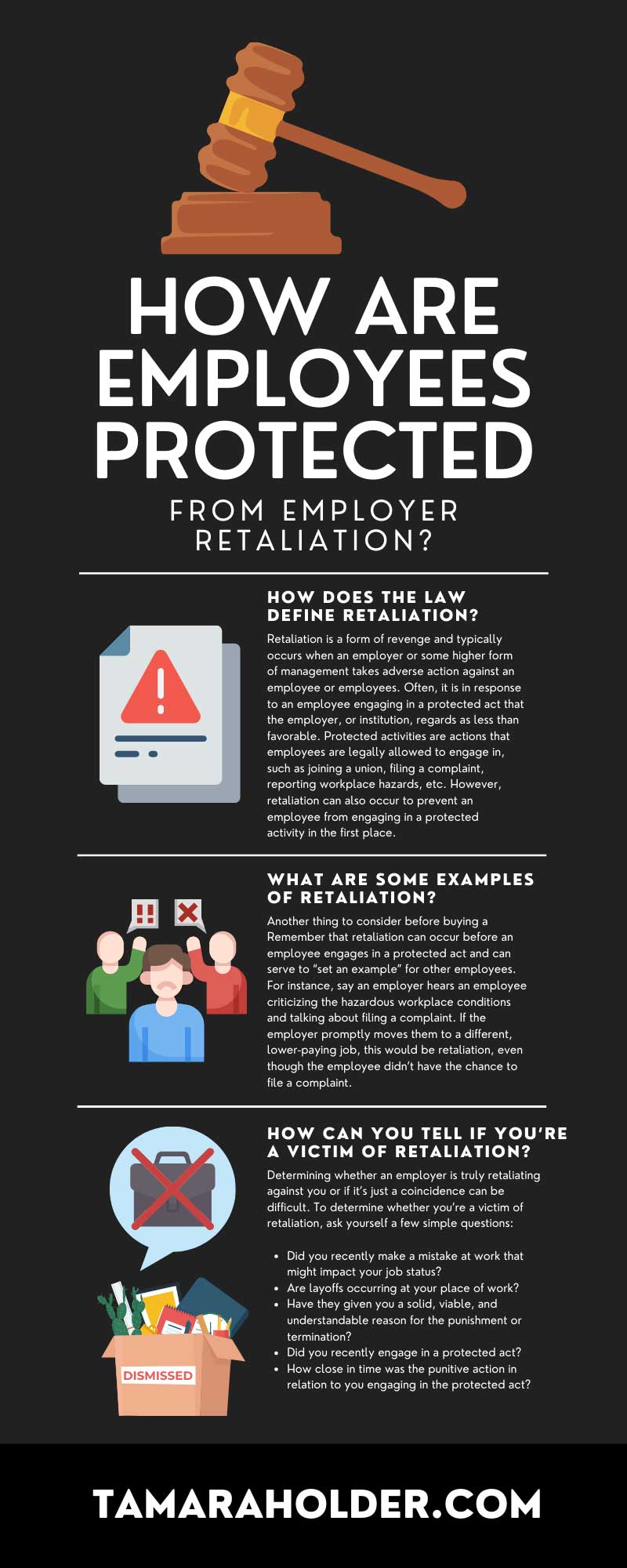How Are Employees Protected From Employer Retaliation?

Retaliation is the act of harming someone as a form of revenge. With the inherent power imbalance in the employee-employer relationship, employers sometimes unjustly punish workers for invalid and illegal reasons. In turn, many employees fear for the security of their job and, subsequently, their income. If you’re concerned that your employer may be seeking revenge against you, and are worried about losing your livelihood, let’s review how the law protects employees from employer retaliation.
How Does the Law Define Retaliation?
As we stated, retaliation is a form of revenge and typically occurs when an employer or some higher form of management takes adverse action against an employee or employees. Often, it is in response to an employee engaging in a protected act that the employer, or institution, regards as less than favorable. Protected activities are actions that employees are legally allowed to engage in, such as joining a union, filing a complaint, reporting workplace hazards, etc. However, retaliation can also occur to prevent an employee from engaging in a protected activity in the first place.
What Are Some Examples of Retaliation?
An employer can retaliate against an employee in several ways, ranging from verbal abuse to reduced hours to termination or anything in between. For example, say an employer sexually harasses an employee, and the employee reports the assault and sues in response. If the employer were to fire the employee for no other reason other than to harm them, this would be considered retaliation.
Remember that retaliation can occur before an employee engages in a protected act and can serve to “set an example” for other employees. For instance, say an employer hears an employee criticizing the hazardous workplace conditions and talking about filing a complaint. If the employer promptly moves them to a different, lower-paying job, this would be retaliation, even though the employee didn’t have the chance to file a complaint.
How Can You Tell if You’re a Victim of Retaliation?
Determining whether an employer is truly retaliating against you or if it’s just a coincidence can be difficult. To determine whether you’re a victim of retaliation, ask yourself a few simple questions:
- Did you recently make a mistake at work that might impact your job status?
- Are layoffs occurring at your place of work?
- Have they given you a solid, viable, and understandable reason for the punishment or termination?
- Did you recently engage in a protected act?
- How close in time was the punitive action in relation to you engaging in the protected act?
If there doesn’t seem to be a good reason as to why your employer punished or fired you, then you may be a victim of retaliation.
Laws That Protect Employees From Retaliation
Victims of retaliation often experience serious financial loss or emotional turmoil. Due to the impact this can have on a person’s livelihood and mental well-being, there are many laws in place to protect employees. Being familiar and up to date with these laws can give you more confidence as an employee and protect you from the fallout of retaliation.
Title VII
Title VII of the Civil Rights Act of 1964 protects employees from being discriminated against based on their color, race, origin, sex, religion, pregnancy status, and/or disability. This act also protects an employee’s ability to take legal action against a discriminatory employer. Therefore, it is illegal for an employer to punish an employee for filing a complaint or taking legal recourse.
The Family Medical Leave Act
Laws regarding time off vary depending on your state and employee contract. However, it is not a crime, nor is it punishable, for an employee to ask for time off, as the Family Medical Leave Act protects you.
Say, for example, you request time off to go to the doctor, go through the proper procedure, and get approval for that time off. On the day of, your employer calls you and tells you to come in because they’re short-staffed that day, but you don’t go in because you’re at the doctor’s office. This might upset your employer, but you’re fully within your legal right to do so, and they cannot retaliate against you for this.
The Occupational Safety and Health Act
A slew of laws articulates precisely what is and isn’t conducive to a safe work environment, from a high-rise construction site to a financial analyst’s office. These laws are in place to keep you safe. The laws may dictate the type of PPE you wear, how your office is set up, and even how much exposure to a material you’re allowed to have. If your employer doesn’t follow these laws and regulations or doesn’t provide a safe work environment, you are allowed to file a complaint under the Occupational Safety Act. For instance, if the only fire escape is broken, and your employer doesn’t take the appropriate action to fix it, your employer cannot legally punish you for filing a complaint.
The Fair Labor Standards Act
Again, state laws and your employment contract will affect your area’s minimum wage and how much pay you receive. However, the Fair Labor Standards Act states that it is within your legal rights to report any kind of wage violation, and your employer cannot punish you for doing so. For example, if you are qualified for overtime pay and don’t receive it, or your employer illegally defers your wage, you can report it. Your employer cannot retaliate against you even if it takes money out of their pocket. They are bound by law to pay you for the work that you do and the amount that you agreed upon.
The National Labor Retaliation Act
One of the most important rights an employee has is the ability to form a union and fight for better working conditions. The National Labor Retaliation acts protects your right as a US citizen to unionize, ask for better pay and working conditions, engage in collective bargaining, and strike. State laws vary, and in some cases, your employee can terminate you for attending a protest or strike. However, they cannot penalize or fire you for simply joining a union.
Many laws protect employees from employer retaliation, and you should never receive punishment for engaging in a protected act. If you believe your employer has unjustly disciplined, penalized, or terminated you, contact the Law Firm of Tamara N. Holder today. Tamara Holder is a knowledgeable, experienced, and dedicated employment dispute lawyer devoted to representing workers who have received unjust treatment.


